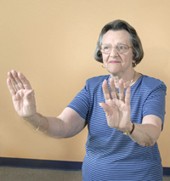Tai Chi Boosts Immunity to Shingles Virus in Older Adults

© Bob Stockfield
Tai chi, a traditional Chinese form of exercise, may help older adults avoid getting shingles by increasing immunity to varicella-zoster virus and boosting the immune response to varicella vaccine, according to research supported by the National Institute on Aging and NCCAM. The study is the first rigorous clinical trial to suggest that a behavioral intervention, alone or together with a vaccine, can help protect older adults from the varicella virus, which causes both chickenpox and shingles.
The randomized, controlled trial, led by Michael Irwin, M.D., at the University of California, Los Angeles, included 112 healthy adults ages 59 to 86. Each person took part in a 16-week program of either tai chi or health education with 120 minutes of instruction weekly. Tai chi combines aerobic activity, relaxation, and meditation, which the researchers note have been reported to boost immune responses.
After the tai chi and health education programs, with periodic blood tests to determine levels of varicella virus immunity, people in both groups received a single injection of VARIVAX, the chickenpox vaccine approved for use in the United States. Nine weeks later, the investigators did blood tests to assess each participant's level of varicella immunity, comparing it to immunity at the start of the study.
Tai chi alone was found to increase participants' immunity to varicella, and tai chi combined with the vaccine produced a significantly higher level of immunity, about a 40 percent increase, over the vaccine alone. The study also showed that the tai chi group's rate of increase in immunity over the course of the study was double that of the health education group. Finally, the tai chi group reported significant improvements in physical functioning, bodily pain, vitality and mental health.
Irwin MR, Olmstead R, Oxman MN. Augmenting immune responses to varicella zoster virus in older adults: A randomized, controlled trial of Tai Chi. Journal of the American Geriatrics Society, April 2007.
For More Information
- For more information on tai chi, visit nccam.nih.gov/health/taichi/
- For more information about shingles, visit niapublications.org/agepages/shingles.asp
To learn more, read the NIA press release.
Sign up for one of our email or RSS notifications to learn when new CAM-related information is available.
